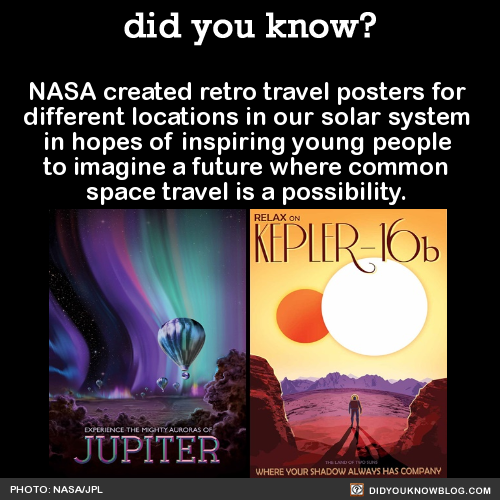Creepy Or Adorable? Researchers At Harvard University Have Demonstrated The First Autonomous, Untethered,
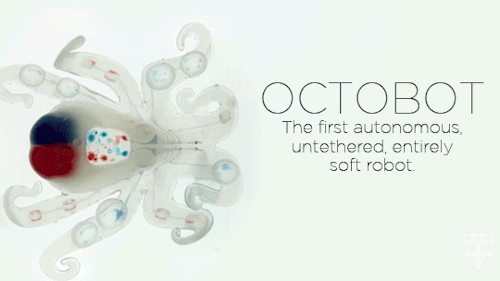
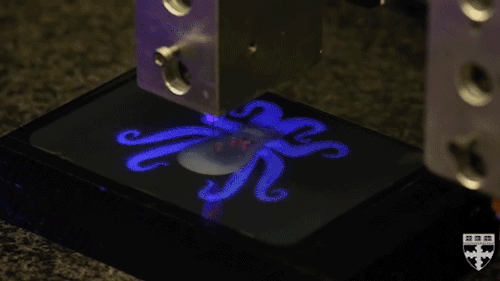
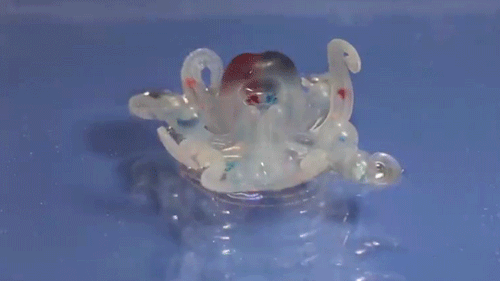
Creepy or adorable? Researchers at Harvard University have demonstrated the first autonomous, untethered, entirely soft robot: the octobot.
Instead of being controlled by electronics, the robot’s logic board is powered by chemical reactions and fluid passing along tiny channels. Scientist have struggled to create completely soft robots because rigid components like circuit boards, power sources and electronic controls are difficult to replace.
Learn more about the octobot and soft robotics here and see the full study published in Nature here.
Videos Credit: Harvard SEAS/Image Credit Lori Sanders
More Posts from Maevetheeuropan and Others
What Did Astronaut Scott Kelly Do After a #YearInSpace?
Astronaut Scott Kelly just returned from his One-Year Mission aboard the International Space Station. After spending 340 days on orbit, you can imagine that he started to miss a few Earthly activities. Here are a few things he did after his return home:
Watched a Sunset

While on the International Space Station for his One-Year Mission, astronaut Scott Kelly saw 16 sunrises/sunsets each day…so he definitely didn’t miss out on the beauty. That said, watching a sunset while on Earth is something that he had to wait to see. Tweet available HERE.
Ate Fresh Food

After spending a year on the International Space Station, eating precooked food, anyone would be excited to dig into a REAL salad. Astronaut Scott Kelly was no exception, and posted about his first salad on Earth after his one-year mission. Learn more about what astronauts eat while in space HERE. Tweet available HERE.
Jumped into a Pool

Water is a precious resource in space. Unfortunately, that means that there isn’t a pool on the space station. Luckily, astronaut Scott Kelly was able to jump into some water after his return to Earth. Tweet/video available HERE.
Sat at a Dinner Table

While living on the International Space Station, crew members regularly enjoy their meals together, but do so while floating in microgravity. The comfort of pulling up a chair to the dinner table is something they can only experience once they’re back home on Earth. Tweet available HERE.
Enjoyed the Weather

When crew members live on the space station they can’t just step outside for a stroll. The only time they go outside the orbiting laboratory is during a spacewalk. Even then, they are confined inside a bulky spacesuit. Experiencing the cool breeze or drops of rain are Earthly luxuries. Tweet available HERE.
Stopped by the Doctor’s Office

The One-Year Mission doesn’t stop now that astronaut Scott Kelly is back on Earth. Follow-up exams and tests will help scientists understand the impacts of microgravity on the human body during long-duration spaceflight. This research will help us on our journey to Mars. Tweet available HERE.
Visited the Denist

When you spend a year in space, you’ll probably need to catch up on certain things when you return to Earth. Astronaut Scott Kelly made sure to include a visit to the dentist on his “return home checklist”. Tweet available HERE.
Make sure to follow us on Tumblr for your regular dose of space: http://nasa.tumblr.com






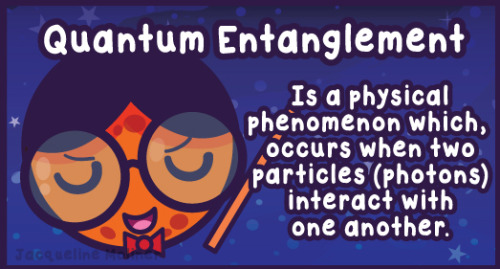
Here’s a comic on something flaming hot!
This week’s comic: Firewall Theory
http://www.sciencealert.com/try-to-escape-a-black-hole-and-you-ll-be-burnt-to-a-crisp-new-paper-cautions
https://profmattstrassler.com/articles-and-posts/relativity-space-astronomy-and-cosmology/black-holes/black-hole-information-paradox-an-introduction/

That’s tonight fyi
Save Science
Not sure what to say. I’m actually legitimately nervous the Cheeto-in-Chief will demand a hold on the National Science Foundation grants like he did the EPA (disclaimer, the NSF is where my job comes from).
I feel so terrible for all the scientists and students who are now out of the job
Solar System: Things to Know This Week
There’s even more to Mars.

1. Batten Down the Hatches
Good news for future astronauts: scientists are closer to being able to predict when global dust storms will strike the Red Planet. The winds there don’t carry nearly the same force that was shown in the movie “The Martian,” but the dust lofted by storms can still wreak havoc on people and machines, as well as reduce available solar energy. Recent studies indicate a big storm may be brewing during the next few months.
+ Get the full forecast

2. Where No Rover Has Gone Before
Our Opportunity Mars rover will drive down an ancient gully that may have been carved by liquid water. Several spacecraft at Mars have observed such channels from a distance, but this will be the first up-close exploration. Opportunity will also, for the first time, enter the interior of Endeavour Crater, where it has worked for the last five years. All this is part of a two-year extended mission that began Oct. 1, the latest in a series of extensions going back to the end of Opportunity’s prime mission in April 2004. Opportunity landed on Mars in January of that year, on a mission planned to last 90 Martian days (92.4 Earth days). More than 12 Earth years later, it’s still rolling.
+ Follow along + See other recent pictures from Endeavour Crater

3. An Uphill Climb
Opportunity isn’t the only NASA Mars rover getting a mission extension. On the other side of the planet, the Curiosity rover is driving and collecting samples amid some of the most scenic landscapes ever visited on Mars. Curiosity’s two-year mission extension also began Oct. 1. It’s driving toward uphill destinations, including a ridge capped with material rich in the iron-oxide mineral hematite, about a mile-and-a-half (two-and-a-half kilometers) ahead. Beyond that, there’s an exposure of clay-rich bedrock. These are key exploration sites on lower Mount Sharp, which is a layered, Mount-Rainier-size mound where Curiosity is investigating evidence of ancient, water-rich environments that contrast with the harsh, dry conditions on the surface of Mars today.
+ Learn more

4. Keep a Sharp Lookout
Meanwhile, the Mars Reconnaissance Orbiter continues its watch on the Red Planet from above. The mission team has just released a massive new collection of super-high-resolution images of the Martian surface.
+ Take a look

5. 20/20 Vision for the 2020 Rover
In the year 2020, Opportunity and Curiosity will be joined by a new mobile laboratory on Mars. In the past week, we tested new “eyes” for that mission. The Mars 2020 rover’s Lander Vision System helped guide the rocket to a precise landing at a predesignated target. The system can direct the craft toward a safe landing at its primary target site or divert touchdown toward better terrain if there are hazards in the approaching target area.
+ Get details
Discover the full list of 10 things to know about our solar system this week HERE.
Make sure to follow us on Tumblr for your regular dose of space: http://nasa.tumblr.com
Five human spaceflight missions to look forward to in the next decade
by Chris Arridge

From astronauts breaking records for the longest amount of time spent in space to experiments growing food and keeping bacteria in orbit, the past decade of human spaceflight has been fascinating. There has also been an explosion of privately-funded spaceflight companies providing access to space, including delivering supplies to the International Space Station (ISS).
The next decade will see a remarkable mix of countries and companies getting involved. Plans include taking humans from low-Earth orbit back to the moon and even an asteroid in the 2020s – all designed to help prepare for the ultimate goal of a human mission to Mars in the 2030s.
Keep reading
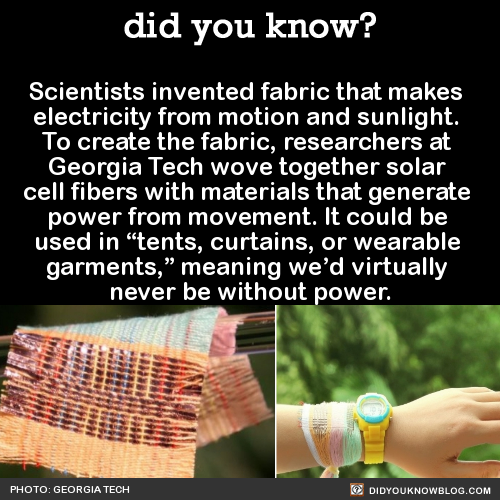
Scientists invented fabric that makes electricity from motion and sunlight. To create the fabric, researchers at Georgia Tech wove together solar cell fibers with materials that generate power from movement. It could be used in “tents, curtains, or wearable garments,” meaning we’d virtually never be without power. Source
ooooo how awesome!

Prototype of Space Station’s Advanced Plant Habitat via NASA http://ift.tt/2fremIw


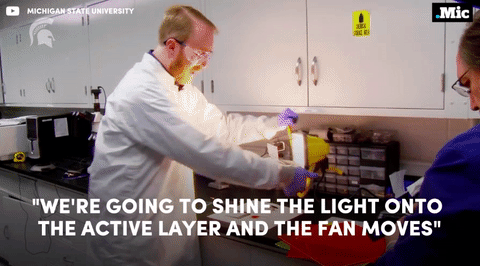

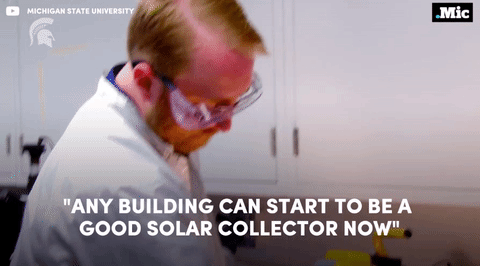
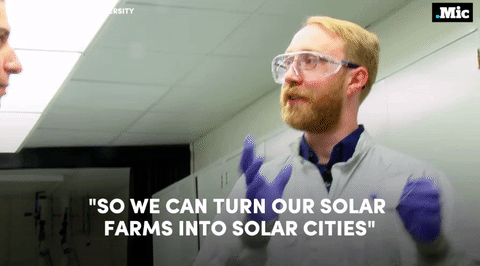
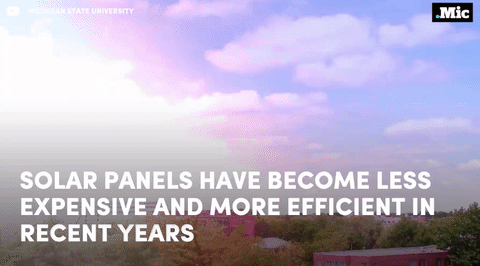



this is a massive step forward for renewable energy (x) | follow @the-future-now
-
 potatosapien5 liked this · 3 months ago
potatosapien5 liked this · 3 months ago -
 the-archivist-raven liked this · 3 months ago
the-archivist-raven liked this · 3 months ago -
 mrnnki liked this · 4 months ago
mrnnki liked this · 4 months ago -
 samcat71470558 liked this · 4 months ago
samcat71470558 liked this · 4 months ago -
 adventuretolkienlover reblogged this · 4 months ago
adventuretolkienlover reblogged this · 4 months ago -
 mybendystraw reblogged this · 7 months ago
mybendystraw reblogged this · 7 months ago -
 art-novice-carb liked this · 7 months ago
art-novice-carb liked this · 7 months ago -
 skulkingfeline liked this · 9 months ago
skulkingfeline liked this · 9 months ago -
 catsinspacesuits liked this · 1 year ago
catsinspacesuits liked this · 1 year ago -
 crystal-99 liked this · 1 year ago
crystal-99 liked this · 1 year ago -
 9dollface6 liked this · 1 year ago
9dollface6 liked this · 1 year ago -
 hintori liked this · 1 year ago
hintori liked this · 1 year ago -
 sleepyfloor reblogged this · 1 year ago
sleepyfloor reblogged this · 1 year ago -
 sleepyfloor liked this · 1 year ago
sleepyfloor liked this · 1 year ago -
 tr4showl liked this · 1 year ago
tr4showl liked this · 1 year ago -
 purehearted-angelg1rl reblogged this · 1 year ago
purehearted-angelg1rl reblogged this · 1 year ago -
 purehearted-angelg1rl liked this · 1 year ago
purehearted-angelg1rl liked this · 1 year ago -
 vegetus-vox reblogged this · 1 year ago
vegetus-vox reblogged this · 1 year ago -
 williamholmes liked this · 1 year ago
williamholmes liked this · 1 year ago -
 arachaoticnid reblogged this · 1 year ago
arachaoticnid reblogged this · 1 year ago -
 aceang reblogged this · 1 year ago
aceang reblogged this · 1 year ago -
 momnaya reblogged this · 1 year ago
momnaya reblogged this · 1 year ago -
 kh3finalmix liked this · 1 year ago
kh3finalmix liked this · 1 year ago -
 virtua reblogged this · 1 year ago
virtua reblogged this · 1 year ago -
 swichieboiii reblogged this · 1 year ago
swichieboiii reblogged this · 1 year ago -
 gogogoat495 liked this · 1 year ago
gogogoat495 liked this · 1 year ago -
 canadiancryptid reblogged this · 1 year ago
canadiancryptid reblogged this · 1 year ago -
 iridescent-hummingbird reblogged this · 1 year ago
iridescent-hummingbird reblogged this · 1 year ago -
 canadiancryptid liked this · 1 year ago
canadiancryptid liked this · 1 year ago -
 sinister-shark liked this · 2 years ago
sinister-shark liked this · 2 years ago -
 fallen-starr reblogged this · 2 years ago
fallen-starr reblogged this · 2 years ago -
 fallen-starr liked this · 2 years ago
fallen-starr liked this · 2 years ago -
 sunkissedempire liked this · 2 years ago
sunkissedempire liked this · 2 years ago -
 funprint liked this · 2 years ago
funprint liked this · 2 years ago -
 shatteredrabbit liked this · 2 years ago
shatteredrabbit liked this · 2 years ago -
 limeadelife liked this · 2 years ago
limeadelife liked this · 2 years ago -
 mothliv reblogged this · 2 years ago
mothliv reblogged this · 2 years ago -
 onlysmokeinsecondhand reblogged this · 2 years ago
onlysmokeinsecondhand reblogged this · 2 years ago -
 onlysmokeinsecondhand liked this · 2 years ago
onlysmokeinsecondhand liked this · 2 years ago -
 marrowbites liked this · 2 years ago
marrowbites liked this · 2 years ago -
 infectbait reblogged this · 2 years ago
infectbait reblogged this · 2 years ago -
 infectbait liked this · 2 years ago
infectbait liked this · 2 years ago -
 609609vv liked this · 2 years ago
609609vv liked this · 2 years ago
